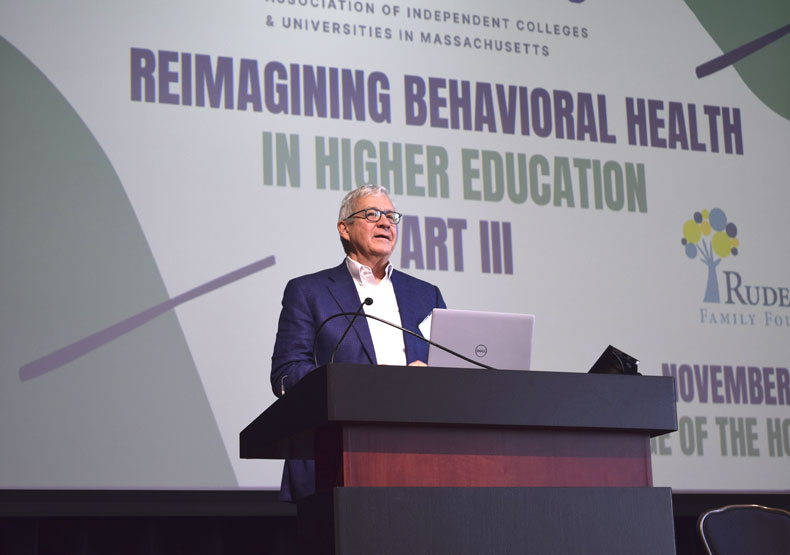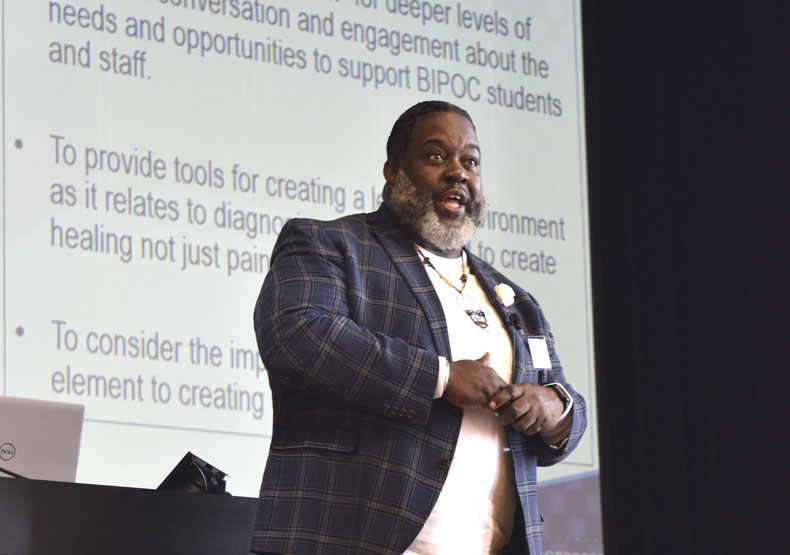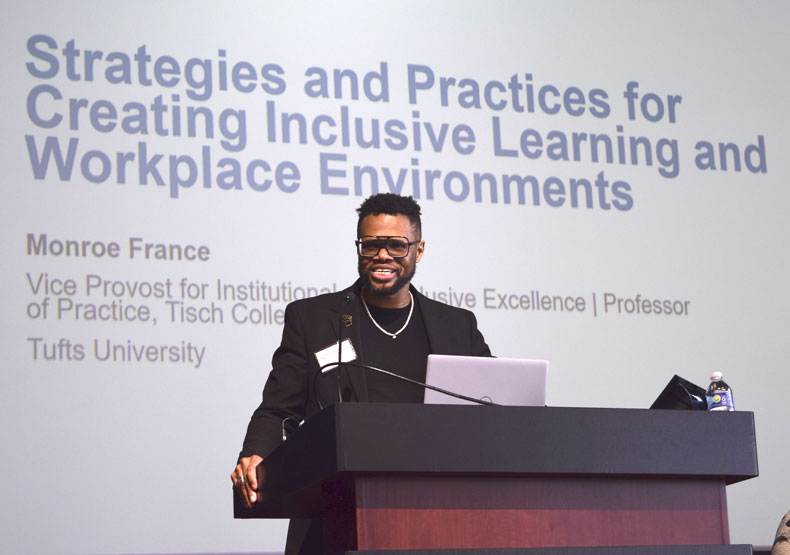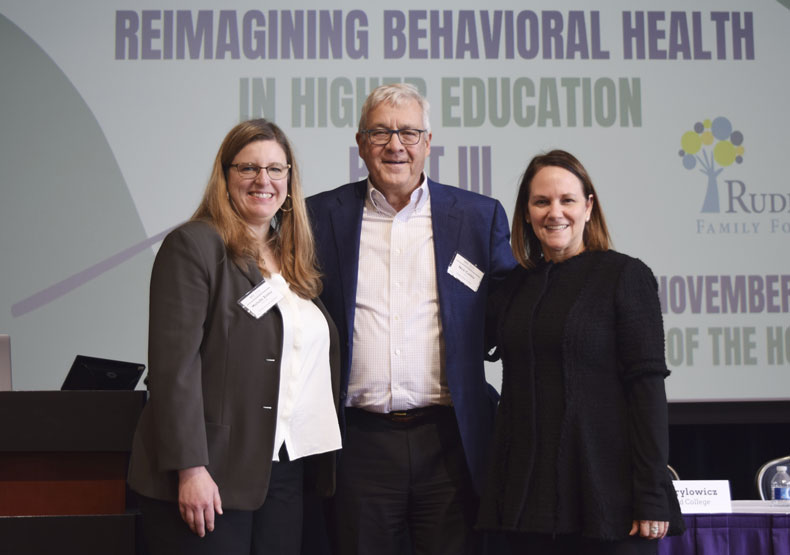For Effective DEIB Efforts, First Know Thyself
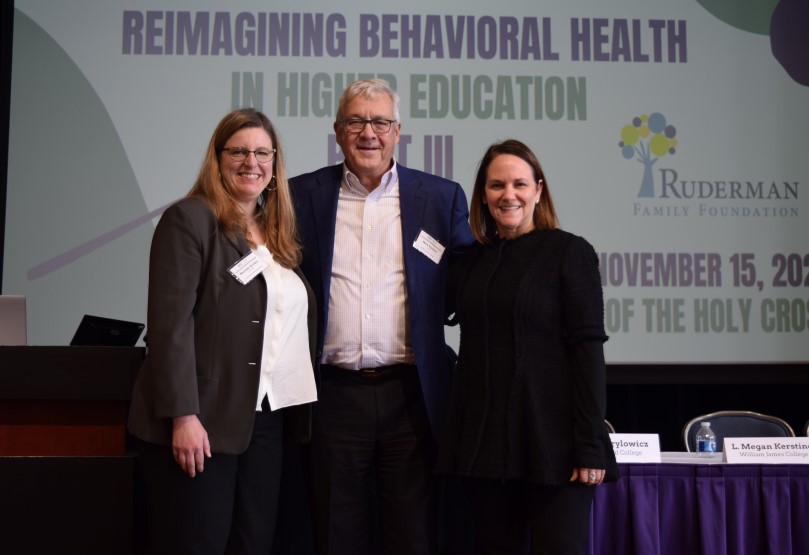
Michelle Zeitler, Nick Covino, and Sharon Shapiro attend the Reimagining Behavioral Health Summit
Over 100 college mental health counselors, administrators, and leaders representing 72 institutions and organizations came together at The College of the Holy Cross for the Reimagining Behavioral Health on Campus summit. This session, which took place on November 15, 2023, was Part III in this behavioral health series and focused on the theme of “Celebrating Diversity.” The forum featured speakers and panelists with expertise in diversity, equity, inclusion, and belonging (DEIB), as well as mental health. This series, initiated by William James College President, Nick Covino, PsyD, is sponsored by the Ruderman Family Foundation (RFF) and the Association of Independent Colleges and Universities in Massachusetts (AICUM).
In his opening remarks, Covino highlighted how the pandemic has worsened young adults’ mental health. “Seventy-five percent of those who develop mental health issues do so during college,” said Covino, adding, “College campuses can be the best antidote.” Michelle Zeitler, RFF program officer, welcomed attendees and announced a new partnership with William James College, which will engage a community of faculty and student-facing staff across New England to promote emotional wellness and safe, positive, and equitable campus cultures.
Keynote speaker, Reverend Dr. Jamie Washington, shared a message about moving beyond treating symptoms to engaging systems for cultural change. He emphasized that the first step for anyone who wants to engage in DEIB work is self-work through the lens of race: being willing to explore and reflect on our own behaviors and consider the honest feedback of others. He emphasized “The Four Agreements of Courageous Conversation” developed by Glenn E. Singleton and Cyndie Hays: (1) Stay engaged, (2) Speak your truth, (3) Experience discomfort., (4) Expect and accept non-closure.
Monroe France, the inaugural vice provost for Institutional Inclusive Excellence at Tufts University and a professor of practice at the Jonathan Tisch College of Civic Life, was the guest speaker on the panel “Understanding the Needs of Our BIPOC Students, Faculty and Staff” during the summit. He centered his comments on the stagnation of change beyond the token or performative level. Evoking the image of weathered and fading Black Lives Matter signs posted in summer 2020 and never refreshed, he emphasized the need to consistently prioritize racial equity in our institutions. He also urged attendees to do this important work by “anchoring in joy and liberation” versus approaching it as an “issue.” He concluded his remarks with, “BIPOC students and faculty are not in need of saving, and we are not a problem to be solved. We are assets, and we need the unjust barriers to our success removed so we can thrive.”
Kimberly Truong, chief equity officer in the Justice, Equity, Diversity, and Inclusion Office at MGH Institute of Health Professions, also spoke on the panel with France. She shared her identity as a refugee from Vietnam from a low socioeconomic background as well as a first-generation college student. In speaking about her experiences as a doctoral student, Truong noted, “I was prepared for the academics, but I wasn’t prepared for the racism.”
Truong is nationally recognized for her research on the experiences of doctoral students of color with racism and racial trauma. Doctoral students of color are a particularly vulnerable population due to power dynamics with faculty as well as underrepresentation in their programs. Truong’s findings on how students experience and cope with racism and discrimination offered valuable insight for strategies to help these students navigate and, ideally, resolve the complexities of racism in higher education settings, which can be highly politicized. Participants’ experiences of racial trauma led to psychological, emotional, spiritual, and even physical consequences, including symptoms of physical pain and illness, dissociation from self, and depression.
Troung concluded her presentation at the summit with the idea that institutions of higher education need to create opportunities for students and staff to engage with race consciously and constructively. It is not enough to cultivate a diverse student population as many colleges and universities have—cross-cultural interaction, understanding, and acceptance do not occur naturally. Rather, institutions need to embrace the collective ownership of creating inclusive environments in academic communities. This idea resounded loudly in the morning’s presentations. As keynote speaker Washington warned: "This work takes energy. When we engage in this work, we often encounter strong resistance. This is not a setback but a natural part of the process." His sentiments echoed those of all the speakers: We must remain strong in our support of one another.
- Tags:
- Research & Advocacy
Topics/Tags
Follow William James College
Media Contact
- Katie O'Hare
- Senior Director of Marketing
- katie_ohare@williamjames.edu
- 617-564-9389

